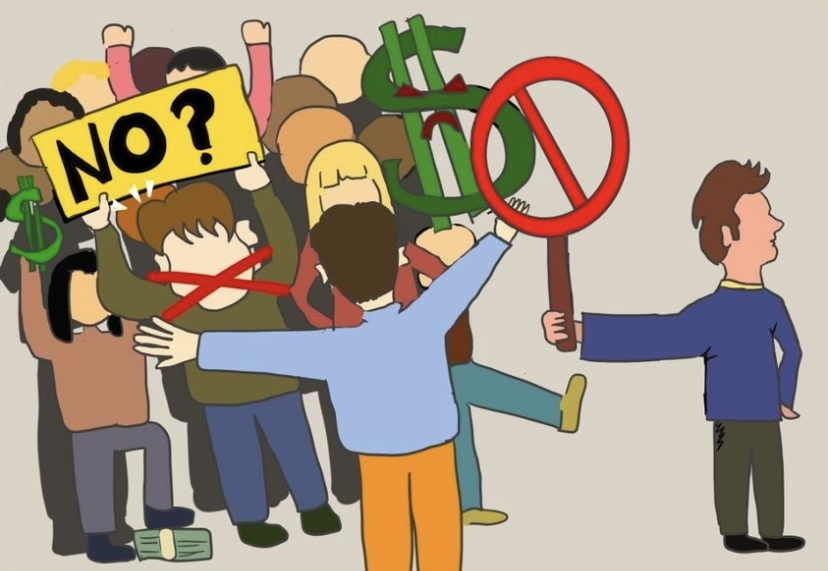Cancel culture hits celebrities—And around the Harkness table
December 16, 2022
To be “canceled” feels quite ubiquitous in today’s society – everyone knows what it is but they don’t really know its definition. Even as enti re culture wars are fought in the name of ending its supposedly tyrannical reign, society has found itself in the odd place where no one knows exactly what it means to be “canceled.”
re culture wars are fought in the name of ending its supposedly tyrannical reign, society has found itself in the odd place where no one knows exactly what it means to be “canceled.”
Despite an ever-blurry definition of cancellation, the phenomenon has once again entered mainstream public dialogue. Repeated acts of antisemitism and racism turned Kanye West into a social pariah, and directly led to the termination of a $1.5 billion brand deal with Adidas. Currently, his backing seems to be limited to far right extremists.
West’s net worth dropped from $1.9 billion to $400 million in a matter of days – four hundred million dollars by no means being a modest amount of wealth, but a stunning drop nonetheless in such a short time. It was at that moment, as his lucrative shoe brand fell through, and with it around three quarters of his money, that some in the pop culture world officially deemed West to be “canceled.”
Geoffrey Nelson is an English teacher with a background in pop cultural journalism. “The definition [of cancel culture] that I work with is that oftentimes, so-called cancel culture is rooted in accountability structures for people saying and doing things that are viewed as, in the language of our age, kind of problematic…the question of who defines that and what accountability looks like is quite interesting because there are plenty of people who have been fully deplatformed who, I would say, have not really met full accountability,” Nelson said.
Growing up in a culture where we must apply disclaimers to many canceled household names has an effect on the way that we interact with our peers, friends, and teachers. Many have acknowledged the ways in which cancel culture empowers individuals to establish cultural bottom lines, and alienate those influencers who reject this established precedent for human decency from public dialogue.
In West’s case, his rapid and public loss of credibility following his blatantly antisemitic remarks may have prevented many fans from blindly following his word. Now that celebrity culture has become largely digitized, social media apps can use other safety mechanisms to effectively cancel highly influential accounts, with features to hide posts that employ hateful language or rhetoric, and to disable accounts after they are found to act in contempt of community guidelines. Furthermore, many believe that to deprive someone of their platform for voicing an opinion which belongs far, far away from mainstream public dialogue, can be an empowering act for non-public figures to redefine harmful narratives.
To this, junior Caleb Tuckman said, “There’s never really been a time where we’ve held celebrities or politicians accountable to the degree where they will be impacted, and so I think that with cancel culture, while sometimes it can be dangerous, I think that if it means that if people are dealing with the consequences of their actions, especially people that are seen as untouchable and don’t usually have to deal with them, I think cancel culture can be a good thing.”
Importantly, though, many feel as though young people being constantly empowered and encouraged to correct behavior that differs from widely accepted public consensus can limit opportunity for constructive dialogue. Especially around the Harkness table, a space where students are constantly invited to develop their own thoughts and ideas to share with a greater audience (that is, the fifteen or so other people around the table), students often self-monitor not only to avoid embarrassment, but to avoid the title of “problematic.”
Violet Paull is the co-founder of Bridge USA, the Masters civic discourse club, and has seen the various ways in which a fear of judgement in our intrapersonal relationships can affect the classroom environment. Of this, Paull said, “I think that cancel culture, in terms of social pressure, have definitely come into play in Harkness where people choose to omit saying things because they think that they’re wrong and they think they’ll be seen as wrong or stupid, or seen as having a viewpoint that is different from the social consensus, because Masters has a very big agreeing culture. Harknesses are graded, so often people are saying things to get a good grade, not because that’s what they really think. This can result in regurgitation of what everyone else is saying because that seems to be the “right” thing to say.”
What can be said for sure, clearly, is that there is a robust discussion around this “culture” throughout the school community.





